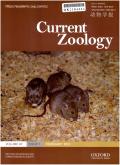自由放养的狗在觅食任务中与人类的偏好相匹配
IF 2
2区 生物学
Q2 ZOOLOGY
引用次数: 0
摘要
社会学习是许多物种用来有效获取环境信息的一种机制。尽管许多动物生活在有其他物种成员存在的环境中,但对种间社会学习知之甚少。驯化和城市化的物种提供了研究非人类动物是否能够向异种动物(如人类)学习的机会,人类是其社会景观的组成部分。虽然人们已经深入研究了家养狗狗向人类学习的能力,但大多数研究都集中在作为宠物生活的狗身上。然而,自由放养的狗代表了世界上大多数的狗,它们与人类生活在一起,以人类的垃圾为食,并受到自然和性选择的影响。因此,自由放养的狗与人类和他们的人工制品广泛接触,提供了在自然环境中研究特定社会学习的机会,在这种环境中,向人类学习可能对它们有益。在这里,我们对个体自由放养的狗进行了受试者间设计:对照组的狗可以自发地在两个新颖的、不同图案的送餐盒之间做出选择。相反,在实验组中,狗首先可以观察到一个不熟悉的人走近并从两个盒子中的一个里吃东西。我们提供的第一个证据表明,自由放养的狗匹配一个不熟悉的人的选择。这些结果表明,在复杂的城市化环境中,狗能成功地与人类生活在一起,至少有简单的种间社会学习形式。本文章由计算机程序翻译,如有差异,请以英文原文为准。
Free-ranging dogs match a human’s preference in a foraging task
Abstract Social learning is a mechanism used by many species to efficiently gain information about their environment. Although many animals live in an environment where members of other species are present, little is known about inter-specific social learning. Domesticated and urbanized species provide the opportunity to investigate whether non-human animals can learn from heterospecifics such as humans, who are integral parts of their social landscape. Although domestic dogs Canis familiaris have been intensively researched for their ability to learn from humans, most studies have focused on dogs living as pets. However, free-ranging dogs represent the majority of the world’s dog population, they live alongside humans, scavenge on human refuse, and are subjected to natural and sexual selection. Thus, free-ranging dogs with extensive exposure to humans and their artifacts provide the opportunity to investigate inter-specific social learning in a naturalistic setting, where learning from humans might be a benefit for them. Here we tested individual free-ranging dogs in a between-subject design: dogs in the control group could spontaneously choose between two novel and differently patterned food-delivering boxes. In the experimental group, instead, dogs could first observe an unfamiliar human approaching and eating from one of the two boxes. We provide the first evidence that free-ranging dogs match the choice of an unfamiliar human. These results show that at least simple forms of inter-specific social learning might be involved in dogs’ success in living alongside humans in a complex urbanized environment.
求助全文
通过发布文献求助,成功后即可免费获取论文全文。
去求助
来源期刊

Current Zoology
Agricultural and Biological Sciences-Animal Science and Zoology
CiteScore
3.20
自引率
9.10%
发文量
111
审稿时长
6 weeks
期刊介绍:
About the Journal
Current Zoology (formerly Acta Zoologica Sinica, founded in 1935) is an open access, bimonthly, peer-reviewed international journal of zoology. It publishes review articles and research papers in the fields of ecology, evolution and behaviour.
Current Zoology is sponsored by Institute of Zoology, Chinese Academy of Sciences, along with the China Zoological Society.
 求助内容:
求助内容: 应助结果提醒方式:
应助结果提醒方式:


